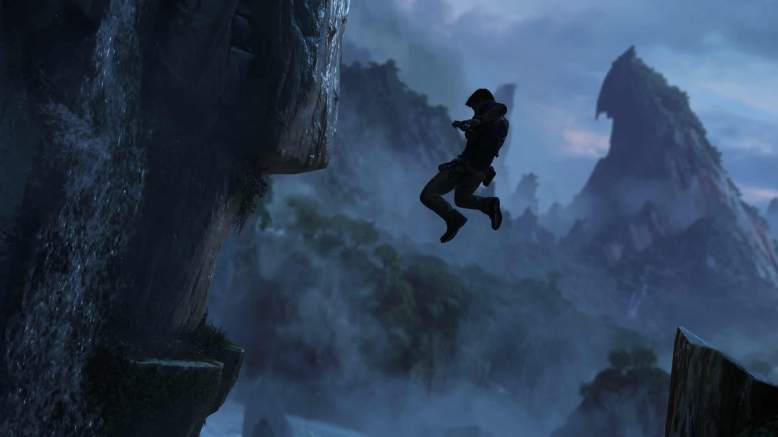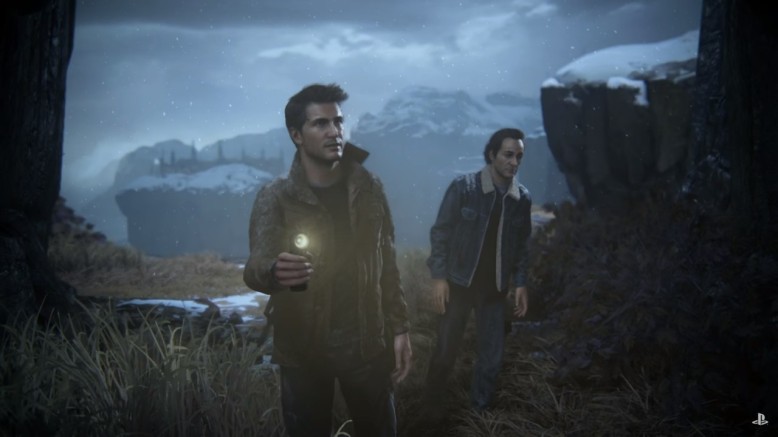Featured image courtesy of usgamer.net
In Uncharted 4, the most telling character moments are unspoken. Bonds forged over years create preternatural connections more chiseled than Nathan Drake’s heroic chin. These are the stories of people who feed off each other’s lives, people who’ve grown together, lost together, laughed together. The gamut of emotions is represented in their psyches, and by extension, in their expressions. For some time, the Uncharted series has been compared to the most bombastic Hollywood franchises of today. It’s the closest things video games have to a Marvel blockbuster, complete with the banter and third-act problem impeding storytelling through frequent combat sequences. Uncharted 4 continues that sort of bluster, spitting out bombast like a late night fast food joint. However, this final arc illuminates the error in that theater comparison, instead showcasing that these characters, and their intertwined digital lives, play out far more like a television show. So much so, that by the end, they create an emotion what only the finest shows can elicit: We never want to leave.
There is a finite amount of famous, antiquated buried treasure in the world. By this fourth entry, one would think Nathan Drake has discovered most of it. However, even as he lays with his most treasured find, his wife Elena, he falls into another source of adventure. This time, it comes from his long-lost brother, Samuel, who Nathan presumed dead after a failed getaway from a mission in a Panamanian prison many years ago. Startled, Nathan discovers that Samuel must collect the buried treasure they were seeking back then, that of the famed Pirate Henry Avery, and return it to a crime kingpin to whom Sam owes his life.
From there, the adventure ensues, as Nathan leaves his domesticated life with Elena, lying to her in the process. It’s quite apparent that Nathan is dealing with strife while adapting to his spacious New York pad and The Wire Season 2 dock working occupation. He’s a maritime trash collector, so the Hero’s call to adventure rings in his ears like an angelic hymn. The lie to Elena is where Uncharted begins its affecting emotional heft, the kind garnered by years of growing closer with an audience. The fib isn’t that of a disgruntled treasure hunter we just met, it’s an admission of his mistrust with a woman we’ve seen Nathan struggle to commit to over three entries. Drake is an impulsive man, and the years we’ve spent with him during this journey makes this lie even more painful. The happy ending remains elusive for Nathan. Perhaps he just needs this one final chase, and then he’ll be happy.
This is the Don Draper syndrome. A man constantly searching for the next thing, hoping it will finally provide the happiness he so desires. For Don, that is generally women, and sometimes advertisements. For Nathan, it’s treasure, and previously women. It’s an addiction, and one we see gradually transform to actualization over the period of the show. Don perpetually pines for the kind of meaningful relationship that validates his life in the wake of an orphaned, distant upbringing. Nathan’s taken a similarly nomadic approach to life, finally settling down after handling the pursuits he believed necessary to bring him happiness. Don believed he had it with Megan, only to discover her youth and vigor didn’t jive with his melancholy middle-aged manhood. He abandoned it, finding peace within himself after stripping away those vanities and returning to his innate sense of self. Nathan has happiness in Elena, but it’s come at the cost of suppressing his adventurous affinity. Drake’s tribulations played out in our lives, his history bared on our screens over the course of four games. Here, it comes home to roost. We can sympathize with him because we know the horrors he’s faced, we’ve lived through it with them both. So to see their genuine affection outshine turbulence feels like a victory in the same way we root for on-screen couples to make it work.

Image courtesy of Expert Reviews
Nathan and Elena are characters tailor-made for ‘shipping. Their flirtatious chemistry was obvious from the start, and this entry only heightens the fact fanboys were right this time around. These two belong together. Drake doesn’t often linger on the women of his past, in fact the love triangle spawned by the second title was quickly whisked under the bed to re-focus on Nathan and Elena’s relationship. Just as the now blip of Karen and Jim in The Office season three was a necessary evil to make Jim realize he truly loved Pam, Nathan’s dalliance helped cement that he belonged with Elena.
These sort of emotional ties are what take Uncharted to storytelling strata other games rarely sniff. It understands the minimal stakes involved with the actual gameplay. The whole game is a series of repeating danger room scenarios. There’s no real investment needed, because there’s no chance these characters are really going to die. Even when a misstep caroms Nathan to his death at the steep, frothy waves below, Naughty Dog’s pristine tech has practically already respawned the player, snuffing out even the brief holler of anguish from companions at Drake’s alternative fate mere seconds ago.
They understand the real stakes lie in the emotional fates of these characters. How they grow together, who they end up with, whether Sully will ever realize those cigars are the greatest danger he’s faced? These are the mundane but more memorable fates resonating with players. Audiences have a deep investment in where a show’s characters end up. How they leave the screen in those final moments, who they end up with, what their last line is. Character beats that seem trivial take on grandiose meaning when recognizing they’ve compounded over literal years of people’s lives. One need only look at the outrage over How I Met Your Mother’s finale to see how affecting a finale can be.
This sort of minutiae speaks to us on a humanistic level because it is us. This reflective quality is precisely why NBC just made a show with almost that exact name, “This is us”. Seeing ourselves in characters takes someone from a flattened plot device to a rounded glimpse at realism. Hinting at the everyday deficiencies one can face in their own life, amidst the turmoil of continual conflict, is why they feel so resonant.When Elena and Nathan so briefly start to spat before pausing it to focus on the mission at hand, the dizzying distress of anyone’s fraught relationship moments likely come back to them. Crafting artifice that lifelike is supremely difficult, that’s why television shows prepare their groundwork for years of a show’s characters and their stories to slowly unspool. Naughty Dog stumbled into that precise scenario, which is why its characters were never truly in danger.
So few games deal with the aging of a character, allowing players to spend enough time with someone that they see those minute shifts in their lives and motivations. More often than not, alterations come as the result of a bombastic event: a death, a murder, a kidnapping, blackmailing. Such are the tropes of many a game, and while Uncharted uses grandiose motivations as justification for its similarly over-the-top set pieces, it deftly understands that its character moments don’t need those sort of titanic shifts. Indeed, the game’s most powerful interactions are generally not the result of a bombastic explosion or motorcycle chase, but caused by simple lies or a hurtful remark. Turns out, those cause far more pain to Drake than the barrage of bullets peppering his ripped frame.

Image courtesy of TechKee
Lies often ripple across seasons of a show, perversely sitting as a Chekhov’s gun prepared to go off. Walter White’s numerous falsities provided a clear illustration of the disastrous aftereffects of that choice. Inside Uncharted 4, there’s an alternate game where the player follows Sam’s fib. His story begins with his false motivations, and you play through the entire ordeal gingerly stepping over the literal and figurative bombshells littering your path. Similarly, the mistrust Nathan shows for Elena belies the relationship we’re privy to in the beginning of this game. These are also the necessities of long-running series. Imbuing drama, recalling tensions buried deep under seasons of a show or new game entries. This collective history allows one to uproot these problems, creating the type of emotional distress only caused by time. Naughty Dog calls upon this approach as the impetus for Nathan’s initial lie. After all, most show’s happy endings are ephemeral. We rarely show what happens after the “just married” convertible drives away.
In Uncharted and television’s case though, these series stroll on. They don’t fade to black, leaving people with a quaint smile. They poke and prod at character’s motivations, leaving players with an opportunity to see how their own perceptions of these characters change as they themselves age. Seeing oneself in the jet-setting, thrill-seeker early game’s Nathan Drake is unlikely, but grappling with the sedentary lifestyle of his adulthood certainly is. That’s the pleasure provided by time, the opportunity to shift how people connect with characters long past their design doc.
Uncharted 4 provides a satisfying coda, giving people one final chance to chew on potential parental issues. The series transformed, not just in terms of gameplay and environmental innovation, but in how its characters traversed the shifting motivations of young adulthood to settling into a career. These universal themes resonated over nine years of people’s existence, consistently reminding people of the fluctuations in their own lives. That is the most powerful part of television, the way it ingratiates itself into one’s life over years. It imbues characters with enough life that to part with them is as painful as saying goodbye to a good friend. No longer just creations, their lifeline matches up with a specific sections of your own.
These aren’t wireframes anymore. Their departure spawns tears. Reminiscing about their own journeys inevitably reminds you of your own. Genuine emotional entanglement is a rare feat, reserved for only the most personally affecting media. Just as shutting off the television after a finale does not sever your tie to a show, ejecting this disc did little to dissuade Uncharted from dancing around my mind.
